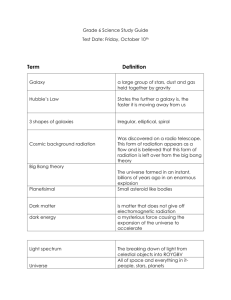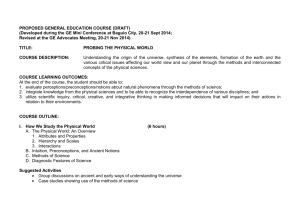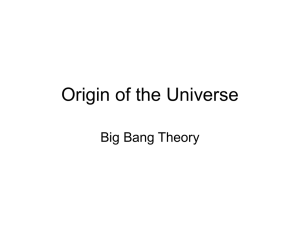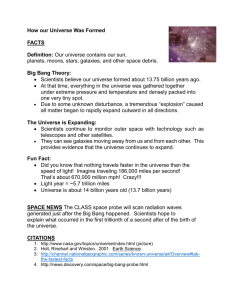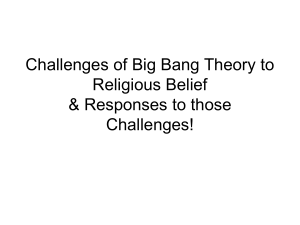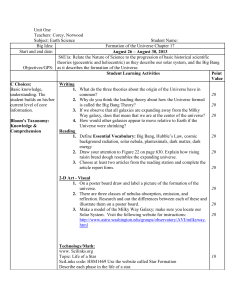How did the universe begin?
advertisement
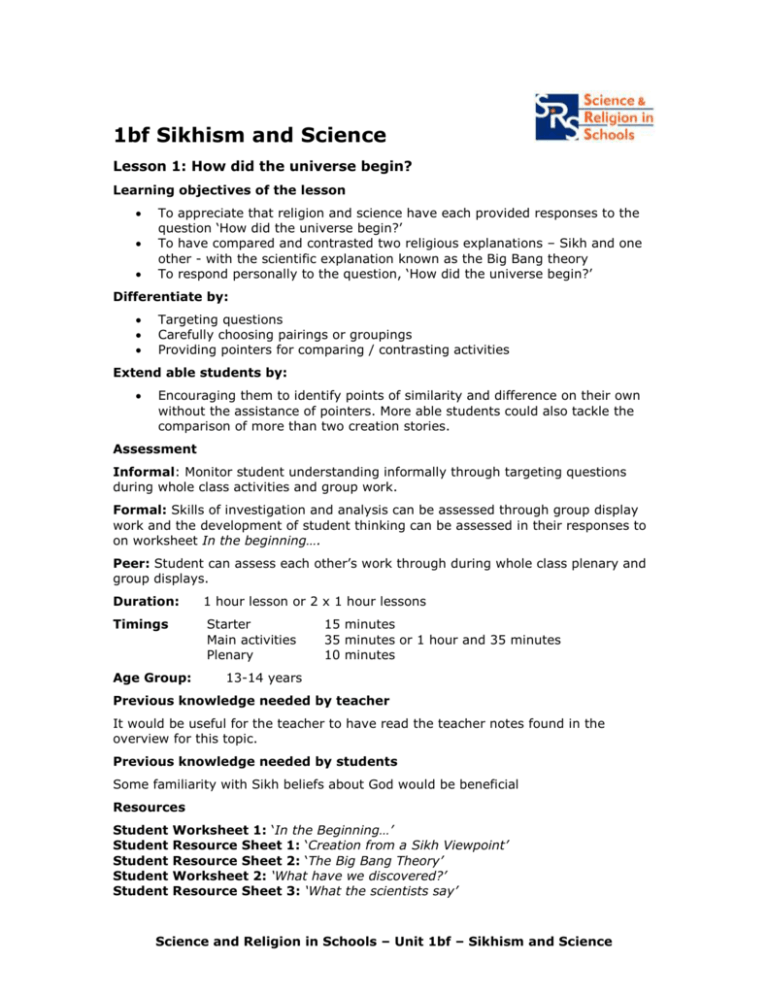
1bf Sikhism and Science Lesson 1: How did the universe begin? Learning objectives of the lesson To appreciate that religion and science have each provided responses to the question ‘How did the universe begin?’ To have compared and contrasted two religious explanations – Sikh and one other - with the scientific explanation known as the Big Bang theory To respond personally to the question, ‘How did the universe begin?’ Differentiate by: Targeting questions Carefully choosing pairings or groupings Providing pointers for comparing / contrasting activities Extend able students by: Encouraging them to identify points of similarity and difference on their own without the assistance of pointers. More able students could also tackle the comparison of more than two creation stories. Assessment Informal: Monitor student understanding informally through targeting questions during whole class activities and group work. Formal: Skills of investigation and analysis can be assessed through group display work and the development of student thinking can be assessed in their responses to on worksheet In the beginning…. Peer: Student can assess each other’s work through during whole class plenary and group displays. Duration: 1 hour lesson or 2 x 1 hour lessons Timings Starter Main activities Plenary Age Group: 15 minutes 35 minutes or 1 hour and 35 minutes 10 minutes 13-14 years Previous knowledge needed by teacher It would be useful for the teacher to have read the teacher notes found in the overview for this topic. Previous knowledge needed by students Some familiarity with Sikh beliefs about God would be beneficial Resources Student Student Student Student Student Worksheet 1: ‘In the Beginning…’ Resource Sheet 1: ‘Creation from a Sikh Viewpoint’ Resource Sheet 2: ‘The Big Bang Theory’ Worksheet 2: ‘What have we discovered?’ Resource Sheet 3: ‘What the scientists say’ Science and Religion in Schools – Unit 1bf – Sikhism and Science Introduction / Starter activity Outline the learning objectives of the lesson. You may wish to begin with a discussion to ascertain the extent of students’ prior awareness of religious and scientific ways of talking about the origins of the universe. Distribute Student Worksheet 1: ‘In the Beginning…’ Allow students time to read and respond to the activity which asks for their initial response to the question ‘How did the universe begin?’ Encourage students to read their answers out to the class and explain their reasons. Main Activities Comparing cosmogonic stories - Organise students into groups of 3 or 4 and provide them with sugar paper and pens. Distribute Student Resource Sheet 1: ‘Creation from a Sikh Viewpoint’, along with one other creation story, and for those who are able, maybe two or three extra creation stories (Hindu; Christian/Jewish; Buddhist; Muslim). Allow students time to read the cosmogonic stories and identify: ways in which the stories are similar ways in which the stories are different They should record their findings on the sugar paper. Allow time for students to compare their findings with other groups. This can be done either as a whole class plenary or by displaying each group’s findings for others to study. Comparing religious and scientific explanations Distribute Student Resource Sheet 2: ‘The Big Bang Theory’ and allow time for students to read and reflect upon it. Explain that religious people have responded to scientific explanations about the origins of the universe in different ways: some have abandoned their faith and accepted science some have clung to a literal reading of their faith and rejected science most have tried to reconcile or bring together their religious outlook with science Using Student Worksheet 2: ‘What have we discovered?’ explain that the students’ next task is to compare the Big Bang theory with the cosmogonic stories they have studied. They are to provide a reasoned, group response to the question ‘Which creation story is easier to reconcile with the Big Bang theory?’ Science and Religion in Schools – Unit 1bf – Sikhism and Science Allow students plenty of time for this activity. This is a difficult activity so, depending on the group, you may wish to give them some pointers. They could focus, for example, on the following: how did the universe begin? how did it develop? how will it all end? what is the time-frame? what is the scale of the universe? Allow time for group responses to be shared with the rest of the class. Students may wish to respond to or challenge the conclusions drawn by other groups. Plenary Encourage students to return to their original sheet ‘In the beginning…’ Have their initial ideas changed after examining a range of religious and scientific explanations for the origins of the universe? If not, why not? If so, why? Review learning objectives of lesson. Science and Religion in Schools – Unit 1bf – Sikhism and Science




